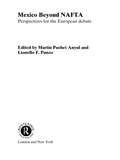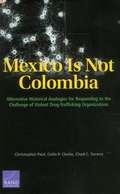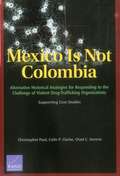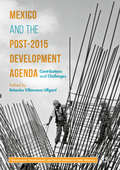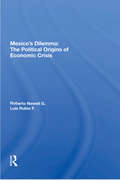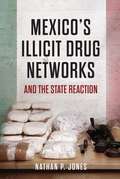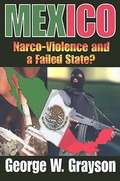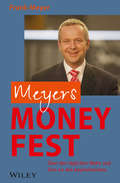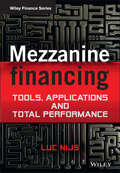- Table View
- List View
Mexico Beyond NAFTA
by Lionello F. Punzo Martín Puchet AnyulWith European Monetary Union well underway, Europe is starting to look at nearby countries and culturally closer continents to define its strategies for the future. In this book, chapters by leading Mexican economists are matched with reactions from European colleagues. They offer a novel viewpoint on the critical assessment of the North American F
Mexico City Water Shortage
by Regina Garcia-Cuellar John D. Macomber Griffin H. James Frederik NellemannIn this case, a property company, a water privatizer, and municipal engineers explore the causes of and solutions to a severe water shortage in Mexico City, a great global capital. The protagonist is a real estate investor doing due diligence on the magnitude of the crisis, the impact on the firm's operations, and the likelihood of resolution. Due diligence includes interviews with city water officials and global-scale water privatizers. This case is an excellent introduction to city scale infrastructure issues on a global level. A related case, "Water Shortage and Property Investing in Mexico City," HBS No. 210-085, contains more real estate finance and less water infrastructure finance material than this case does.
Mexico City's Water Supply: Improving the Outlook for Sustainability
by The Joint Academies Committee on the Mexico City Water SupplyThis book addresses the technical, health, regulatory, and social aspects of ground water withdrawals, water use, and water quality in the metropolitan area of Mexico City, and makes recommendations to improve the balance of water supply, water demand, and water conservation. The study came about through a nongovernmental partnership between the U.S. National Academy of Sciences National Research Council and the Mexican Academies of Science and Engineering. The book will contain a Spanish-language translation of the complete English text.
Mexico Is Not Colombia: Alternative Historical Analogies for Responding to the Challenge of Violent Drug-Trafficking Organizations
by Christopher Paul Colin P. Clarke Chad C. SerenaDespite the scope of the threat they pose to Mexico's security, violent drug-trafficking organizations are not well understood, and optimal strategies to combat them have not been identified. While there is no perfectly analogous case from history, Mexico stands to benefit from historical lessons and efforts that were correlated with improvement in countries facing similar challenges related to violence and corruption.
Mexico Is Not Colombia: Alternative Historical Analogies for Responding to the Challenge of Violent Drug-Trafficking Organizations, Supporting Case Studies
by Christopher Paul Colin P. Clarke Chad C. SerenaDespite the scope of the threat they pose to Mexico's security, violent drug-trafficking organizations are not well understood, and optimal strategies to combat them have not been identified. While there is no perfectly analogous case to Mexico's current security situation, historical case studies may offer lessons for policymakers as they cope with challenges related to violence and corruption in that country.
Mexico and the Post-2015 Development Agenda
by Rebecka Villanueva UlfgardThis interdisciplinary edited collection presents original analysis on Mexico's transition from the Millennium to the Sustainable Development Goals, departing from three main perspectives. In what areas did Mexico gain leverage and actually contribute to the debate around the proposed SDGs? What are the challenges for Mexico with regard to the SDGs? How to handle the issue of congruence/dissonance in Mexico's accomplishment of the MDGs in relation to the socioeconomic realities on the ground? The contributing authors examine what kind of state is needed to strengthen democratic politics and social justice, but also to improve the economic effectiveness of the state and thereby prospects for development. For Mexico, what is missing is a clear vision for creating a progressive, truly modern society where the notion of a social contract between the government and citizens could be established along the lines of a welfare state that is inclusive, sustainable, and transformative enough to tackle seriously the fundamental socioeconomic injustices dividing Mexicans.
Mexico's Dilemma: The Political Origins Of Economic Crisis
by Roberto Newell G. Luis Rubio F.This book analyzes the crisis Mexico experienced in 1982 on the basis of the historical evolution of Mexico's political and economic structures. The author’s purpose in writing this book is to provide an interpretation of Mexico's current problems in order to analyze what must be done to solve some profound dilemmas and to restructure Mexican society. The main dilemma Mexico faces is its vanishing consensus.
Mexico's Energy Reform
by Richard H.K. Vietor Haviland Sheldahl-ThomasonEnergy - both petroleum and electricity - had been terribly managed for decades in Mexico. The two national monopolies - PEMEX and CFE - were inefficient, overstaffed, corrupt, rife with subsidies, and losing money. Finally, in 2012, President Enrique Pena Nieto announced his intent to drastically reform both. Over the next two years, the Mexican constitution was amended, and a dozen implementing laws were passed, to break up the CFE, reorganize PEMEX, and impose competition between the pieces. By 2017, tracts of offshore oil were auctioned, renewable contracts were auctioned, and new regulators were trying to impose competition downstream in electricity.
Mexico's Illicit Drug Networks and The State Reaction
by Nathan P. JonesMexican drug networks are large and violent, engaging in activities like the trafficking of narcotics, money laundering, extortion, kidnapping, and mass murder. Despite the impact of these activities in Mexico and abroad, these illicit networks are remarkably resilient to state intervention. Drawing on extensive fieldwork and interviews with US and Mexican law enforcement, government officials, organized crime victims, and criminals, Nathan P. Jones examines the comparative resilience of two basic types of drug networks--"territorial" and "transactional"--that are differentiated by their business strategies and provoke wildly different responses from the state. Transactional networks focus on trafficking and are more likely to collude with the state through corruption, while territorial networks that seek to control territory for the purpose of taxation, extortion, and their own security often trigger a strong backlash from the state. Timely and authoritative, Mexico's Illicit Drug Networks and the State Reaction provides crucial insight into why Mexico targets some drug networks over others, reassesses the impact of the war on drugs, and proposes new solutions for weak states in their battles with drug networks.
Mexico's Integration into NAFTA Markets: A View from Sectoral Real Exchange Rates and Transaction Costs
by Rodolphe Blavy Luciana JuvenalA report from the International Monetary Fund.
Mexico, Interrupted: Labor, Idleness, and the Economic Imaginary of Independence (Critical Mexican Studies)
by Sergio Gutiérrez NegrónMexican independence was, in a sense, an economic event. Through economic concerns, elites created a common ground with non-elites in their demands against foreign domination, and independence was imagined by the lettered men of Mexico as a feat that would nationalize a rich and productive economic apparatus. Mexico, Interrupted investigates these economic hopes during the difficult decades between 1821, the year of the country&’s definite separation from Spain, and 1852, a period of political polarization after the US-Mexico War that led the country to the brink of another armed conflict. Drawing on political and popular media, this book studies the Mexican intelligentsia&’s obsession with labor and idleness in their attempts to create a wealthy, independent nation. Focusing on figures of work and its opposites, Mexico, Interrupted reconstructs these decades&’ &“economic imaginaries of independence&”: the political and cultural discourses that structured understandings, beliefs, and fantasies of the relationship between &“the economy&” and the life of an independent polity. By bringing together intellectual history, critical theory, and cultural studies, Gutiérrez Negrón offers a new account of the Mexican nineteenth century and complicates the history of the &“spirit of capitalism&” in the Americas.
Mexico: 2001 Article IV Consultation--Staff Report; Staff Statement; Public Information Notice on the Executive Board Discussion; and Statement by the Executive Director for Mexico
by International Monetary FundA report from the International Monetary Fund.
Mexico: Crisis and Competitiveness
by Aldo Musacchio Richard H.K. Vietor Regina Garcãa-Cuã©llarIn 2010, the bicentennial anniversary of Mexico's revolution against Spain, Mexican President Felipe Calderon hoped he could orchestrate several crucial reforms that Mexico needed. Mexico had not grown much over the course of the last decade, losing competitiveness to China and other Asian countries. Several of its institutions, including labor, education, healthcare, energy, and antitrust, seemed uncompetitive. But with a weaker peso and greater governmental attention to infrastructure, Calderon hoped that Mexico's higher-tech exports could recapture U.S. market share and make headway in Europe and Latin America.
Mexico: Financial Sector Assessment Program Update--Detailed Assessment of Compliance with the Basel Core Principles for Effective Banking Supervision and Transparency of Banking Supervision
by International Monetary FundA report from the International Monetary Fund.
Mexico: Financial Sector Assessment Program Update--Detailed Assessment on the Implementation of the IOSCO Objectives and Principles of Securities Regulation
by International Monetary FundA report from the International Monetary Fund.
Mexico: Narco-violence and a Failed State?
by George W. Grayson* Mexico was named an Outstanding Academic Title of 2010 by Choice Magazine. Bloodshed connected with Mexican drug cartels, how they emerged, and their impact on the United States is the subject of this frightening book. Savage narcotics-related decapitations, castrations, and other murders have destroyed tourism in many Mexican communities and such savagery is now cascading across the border into the United States. Grayson explores how this spiral of violence emerged in Mexico, its impact on the country and its northern neighbor, and the prospects for managing it. Mexico's Institutional Revolutionary Party (PRI) ruled in Tammany Hall fashion for seventy-nine years before losing the presidency in 2000 to the center-right National Action Party (PAN). Grayson focuses on drug wars, prohibition, corruption, and other antecedents that occurred during the PRI's hegemony. He illuminates the diaspora of drug cartels and their fragmentation, analyzes the emergence of new gangs, sets forth President Felipe Calder�n's strategy against vicious criminal organizations, and assesses its relative success. Grayson reviews the effect of narcotics-focused issues in U. S. -Mexican relations. He considers the possibility that Mexico may become a failed state, as feared by opinion-leaders, even as it pursues an aggressive but thus far unsuccessful crusade against the importation, processing, and sale of illegal substances. Becoming a "failed state" involves two dimensions of state power: its scope, or the different functions and goals taken on by governments, and its strength, or the government's ability to plan and execute policies. The Mexican state boasts an extensive scope evidenced by its monopoly over the petroleum industry, its role as the major supplier of electricity, its financing of public education, its numerous retirement and health-care programs, its control of public universities, and its dominance over the armed forces. The state has not yet taken control of drug trafficking, and its strength is steadily diminishing. This explosive book is thus a study of drug cartels, but also state disintegration.
Mexico: Selected Issues
by International Monetary FundA report from the International Monetary Fund.
Mexico: Shifting Left with AMLO
by Richard H.K. VietorAndres Manuel Lopez Obrador became president of Mexico on December 1, 2018. His election, and the victory of his new Party, MORENA, represent a sharp shift to the left by Mexico's political system. Previously, President Pena Nieto and his party, the PRI, had initiated and implemented the Pacto - a long overdue series of institutional and structural reforms. Yet even after several years, Mexico had not shown significant improvements in productivity, or growth. With U.S. relations at a low point, thanks to President Trump's neo-isolationism, Mexico elected Obrador as a nationalistic response. It remained to be seen how his new policies would affect Mexico's growth.
Mexico: The Strategy to Achieve Sustained Economic Growth
by Liliana Rojas-Suarez Eliot Kalter Sharmini Coorey Saul Lizondo Claudio Loser Mohamed El-Erian Philippe SzymczakThis paper explores the reasons behind the recent transformation and upturn of the Mexican economy. the changes are the result of the authorities' determination to stick with a difficult reform program since the early 1980s, supported by multilateral financial institutions, creditor countries, and commercial banks.
Mexico: The Tequila Crisis--1994-95
by Huw PillDescribes the evolution of the Mexican economy and its relation to the international capital markets in the period leading up to the Peso crisis of December 1994. Emphasizes the role of "Washington consensus" policies in stimulating the inflows and the inability of the Mexican banking system to intermediate them efficiently.
Mexico’s Merchant Elite, 1590–1660: Silver, State, and Society
by Louisa Schell HobermanCombining social, political, and economic history, Louisa Schell Hoberman examines a neglected period in Mexico's colonial past, providing the first book-length study of the period's merchant elite and its impact on the evolution of Mexico.Through extensive archival research, Hoberman brings to light new data that illuminate the formation, behavior, and power of the merchant class in New Spain. She documents sources and uses of merchant wealth, tracing the relative importance of mining, agriculture, trade, and public office. By delving into biographical information on prominent families, Hoberman also reveals much about the longevity of the first generation's social and economic achievements.The author's broad analysis situates her study in the overall environment in which the merchants thrived. Among the topics discussed are the mining and operation of the mint, Mexico's political position vis-a-vis Spain, and the question of an economic depression in the seventeenth century.
Meyers Money Fest: Über den täglichen Wahn und Sinn an den Kapitalmärkten
by Frank MeyerKlug, bisweilen zynisch, manchmal schmerzhaft, aber immer sehr komisch – Meyers Money-Fest ist ein echtes Lesevergnügen! Herrlich politisch unkorrekt befasst sich der bekannte n-tv-Journalist Frank Meyer in seinem Buch pointiert, unterhaltsam und sehr persönlich mit dem »lieben Geld«. Lesen Sie zum Beispiel von … Sprengsätzen im Portemonnaie, Plansinn und Wahnsinn an den Finanzmärkten, »gezyperten« Konten, Absurdistan und dem Märchen der Gebrüder Bank, dem Efft-Efft-Spray gegen Verschwörer aus der dunklen Welt der Wirtschaft und Börse, von Klimbim, Klabauter und Klamauk vermeintlich richtiger, medial gestreuter Informationen. Auf humorvolle und satirische Weise erklärt Ihnen Frank Meyer in Kolumnenform das angeblich hochkomplexe Thema Geld verständlich und einfach. Wenn Sie jetzt denken, sich mit Geld zu beschäftigen sei langweilig, lästig und führt zu nichts, da es uns sowieso täglich zwischen den Händen zerrinnt – Meyers Money-Fest beweist Ihnen das Gegenteil. So ein Finanzbuch haben Sie noch nie gelesen!
Mezzanine Financing
by Luc NijsAn in-depth explanation of mezzanine financeMezzanine finance products, which have grown increasingly popular in recent years, involve a unique and complex form of analysis because of their hybrid nature. Because mezzanine finance involves no collateral, it accentuates legal terms, term sheets, and contracts, in addition to depicting dynamics of both debt and equity. Experienced chairman, lecturer, and professor of investment banking Luc Nijs presents readers with a thorough description of product groups, structuring and pricing, and cultural discrepancies in terms of regulation and application in Mezzanine Financing: Tools, Applications and Total Performance. Nijs analyzes common triumphs and failures encountered in mezzanine financing, and he discusses techniques for risk analysis and risk mitigation. A final study of international capital markets, their products' relevance, attractiveness, and liquidity, and the effects on pure equity/fixed-income risk concludes the book.Conveys a professional's advice through case studies of various regions, industries and contextsProvides the only complete analysis of mezzanine finance as no other books take on the topic as their only subjectDetails an increasingly popular and globally relevant subject in financeThose seeking a detailed explanation of the complexities within mezzanine financing will encounter a professional account in Nijs's book.
Mi dinero, mis reglas: Toma el control de tus finanzas
by Kumiko LoveLa Marie Kondo de las finanzas personales comparte un método que alinea tu salud emocional con la de tus finanzas, deja de lado las carencias y comienza a impulsar tus sueños. Por siglos, a las mujeres nos han dicho que somos muy buenas para gastar el dinero en banalidades y caprichos hasta endeudarnos, pero somos poco hábiles para las finanzas: que los presupuestos son aburridos y que no vamos a entenderlos. Kumiko Love se enfrentó a estas creencias limitantes y cambió su relación con el dinero en cuanto entendió que debía liberarse de la vergüenza y los juicios sociales para aterrizar sus finanzas a su realidad y valores. En Mi dinero, mis reglas, comparte su método para entender las emociones detrás de los comportamientos financieros y tomar el control de nuestras finanzas sin importar el nivel de ingresos o deudas que tengamos. Este libro te dará las herramientas para: * Crear un presupuesto basado en tu vida real y no en una vida de negación, que te permita adaptarlo a tus intereses. * Crear un plan efectivo para salir de deudas que te devuelva el entusiasmo sobre el futuro. * Priorizar gastos que sumen a tu proyecto financiero * Usar tus emociones a favor de tus finanzas en lugar de que estas te saboteen. * Ahorrar sin pensar en ello. Este revolucionario sistema te enseñará a honrar tus valores personales, al tiempo que diriges tus emociones y necesidades hacia la plenitud financiera. Deja de preocuparte por el dinero y empieza a disfrutar cada momento al máximo, porque la abundancia no está en cuánto tienes sino en cómo vives
Mi vecino es un robot
by Cicero, Paola Juarez Mojica, JavierUn mosaico que refleja la complejidad de una ciencia joven que ya no es producto de una sola rama del conocimiento humano, sino de la interdependencia de todo nuestro conocimiento. Un conjunto de ensayos de expertos que evidencian cada uno de los aspectos más problemáticos de la Inteligencia Artificial con la realidad mexicana. En Mi vecino es un robot se busca explorar qué es la Inteligencia artificial más allá de la categoría simplista que se le ha otorgado como tecnología. Busca abordar algunos de los principales mitos y crear una amalgama que refleje el valor de un área en desarrollo del conocimiento humano, abriendo al lector los caminos por desarrollar y explorar que tiene como ciencia y promoviendo, en algunos casos, una perspectiva crítica sobre sus retos e implicaciones. En la medida que entendamos a la IA, sus impactos y sus retos, estaremos en condiciones de proponer medidas, como lectores y como sociedad, sobre cuál es el rumbo que queremos seguir a fin de que la tecnología no se convierta en otro factor de desigualdad.
